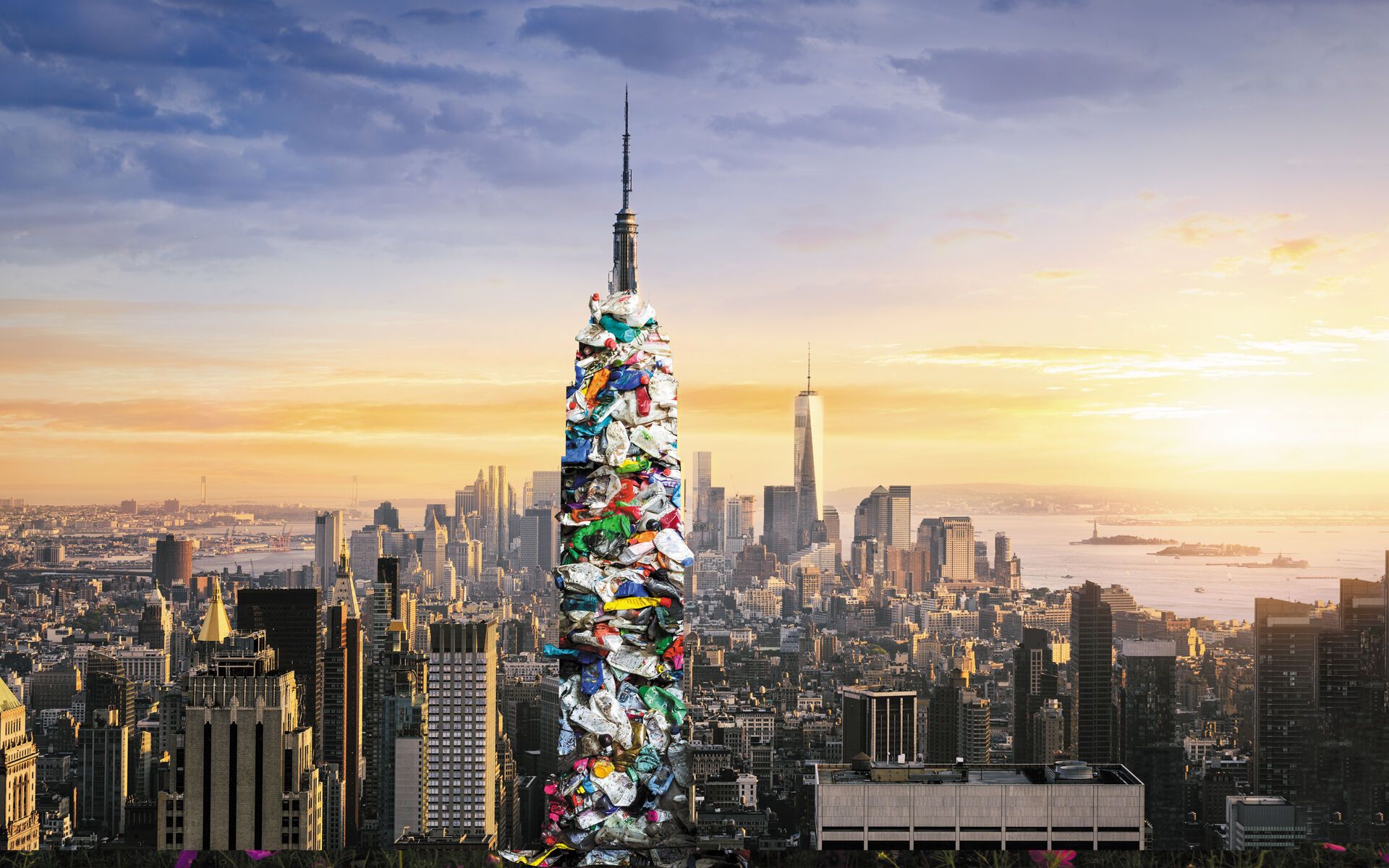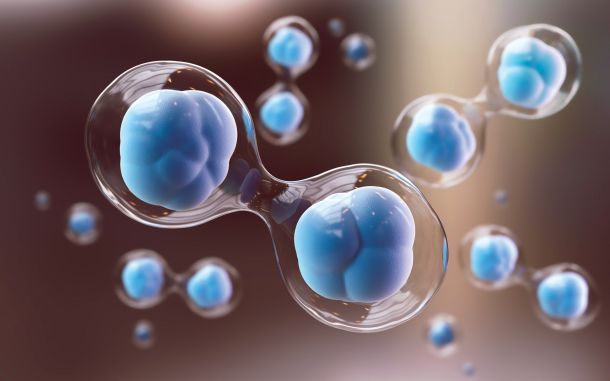Cleanliness, Everywhere

In This Article
-
It is estimated that the plastic waste in dump sites would reach 35,000 times the weight of the Empire State Building by 2050.
-
The atmosphere is much more capable of self-cleaning than previously thought. It was found that air pollution declined due to quarantine measures implemented during the recent COVID-19 pandemic.
-
The fungi feeding on radiation at the Chernobyl Nuclear Power Plant, the worms collecting poisonous heavy metals, and the bacteria decomposing the oil leaking into the sea are some of the examples of nature’s janitors.
People of discernment should contemplate on the fact that, from the microcosm to the macrocosm, there is a highly systematic process of cleaning and recycling despite continuous movements and mind-boggling circulations. Numerous beings, from huge stars to single-celled bacteria or from vultures to white blood cells, are employed as cleaners.
In the 21st century, as humans we have contaminated the lands, seas, and even outer space, and, so far, we have recycled only 9 percent of the plastics we have produced [1]. It is estimated that the plastic waste in dump sites would reach 35,000 times the weight of the Empire State Building by 2050 [2]. Humankind is incapable of properly performing our cleaning and recycling duties despite all our knowledge, skills, and technology. In comparison, the Earth was in a clean and orderly state before the human intervention has reached its current level.
Cosmic cleanliness and the role of Jupiter
This process of cleaning and purifying occurs all across the universe as stars go through various stages during the lifetime designated for them. Asteroids are swept by planets and placed into certain orbits, and even light cannot escape from a black hole's gravity. A seven-year study by 100 astronomers and published in 2016 found that stars facilitated the cleaning of the universe by collecting star dust [3]. In a sense, stars work like huge vacuum cleaners to absorb cosmic particles, ensuring that galaxies are cleaner.
Scientists note that Jupiter, 1,321 times larger in volume and 318 times heavier in mass than the Earth, has the duty of acting as a shield to protect our planet from asteroids [4]. If asteroids with a diameter up to 10 meters escape the giant planet's gravitational field, they are eaten up by the Earth's atmosphere through friction. NASA reports that there is no record of any person killed by an asteroid, and the likelihood of a big asteroid hitting the Earth for the next several centuries is calculated as extremely low [5]. The creation of suitable conditions for the life on Earth is strongly connected to the size and location of Jupiter.
Self-cleaning of the atmosphere and skies washed by rainfall
Air pollution is a very thought-provoking example of how human beings mismanage available resources with their proclivity for interfering with everything. A 2011 study revealed that the atmosphere is much more capable of self-cleaning than previously thought [6]. It was found that air pollution declined due to quarantine measures implemented during the recent COVID-19 pandemic. Thus, the nitrogen dioxide levels decreased by 30 percent in the United States, and 49 percent in Rome, making stars more visible to the naked eye [7].
When water evaporates, it leaves sediments behind, and water vapor is stored in clouds that are capable of holding tons of water. When needed, this vapor turns back into water and falls down on the earth in the form of rainfall that also clears away the dust particles hanging on the air. This is another process of purification. Having cleaned the air, the water is then filtered through different layers of soil, becoming purer, and it is eventually made available as groundwater that can be safely consumed by human beings.
Water as universal solvent
What sets water apart from other liquids, in addition to its numerous miraculous characteristics, is that many substances can easily dissolve in water. As such, water is referred to as a universal solvent, in scientific parlance. Water molecules are formed with positively charged hydrogen ions (H+) bonded to negatively charged hydroxide ions (OH-); they have a polar chemical structure. This allows water to be pulled by different molecules. Thus, chemical substance such as minerals and food molecules attached to water molecules are carried away with water [8], and in this way, water acts both as a cleaning and shipping agent. Water ensures the dissolution of the molecules required for our bodies. Working in perfect harmony with our kidneys, it also fulfills the duty of transporting waste materials produced as a result of metabolic activities to excretion organs and discharging them out of the body.
Bacteria: heroes of recycling
The fungi feeding on radiation at the Chernobyl Nuclear Power Plant, the worms collecting poisonous heavy metals, and the bacteria decomposing the oil leaking into the sea are some of the examples of nature’s janitors. Bacteria, in particular, are the heroes of recycling on Earth. In carbon, nitrogen, sulfur, and phosphor cycles, bacteria ensure that these elements are turned into forms that can be easily used by plants and animals. In performing their duty of filtering and refining, bacteria break up dead organisms, giving nitrogen to the soil in the form of ammonia and to the atmosphere through denitrification [9].
Bacteria, making up more than three-fourths of the known species, have been performing this duty of decomposing and recycling perfectly for millions of years. “If it were not for this cleaning, sweeping and careful tending, in one year a hundred thousand animal species would have been choked on the face of the earth,” Bediuzzaman Said Nursi notes [10]. For instance, the number of eggs laid by the progeny of a single housefly in five months exceeds five trillion. In other words, the progeny of a housefly weighing about 1 percent of 1 gram can produce an army of houseflies weighing 80,000 tons [11]. If only dead bodies of houseflies were not cleaned, it would be impossible to live on Earth.
Vultures as cleaners
Vultures are another group of animals that fulfill the duty of cleaning. It was calculated that a single vulture provides waste removal services worth about $11,600 during its lifetime. As the number of vultures declined in Asia, the population of wild dogs increased by 5.5 million, and cases of rabies skyrocketed; some 47,000 people died [12].
Cleaning factories in our bodies
The human body, too, features a never-ceasing process of cleaning, purification, and repair. Every breath we take, or every pulse of our heart, is part of this biological and chemical cleaning process. White blood cells go after bacteria and purify the blood like a predator stalking its prey [13]. Our tears contain antimicrobial molecules that can directly kill several pathogenic organisms [14]. Macrophages patrolling under our skin are like garbage trucks that collect damaged cells and bacteria [15].
All these systems and many similar ones in our bodies are astonishing manifestations of infinite wisdom and consciousness. Freeing the mind from doubts or polishing the heart with the light of belief are among spiritual manifestations of this principle of cleanliness in humans.
"The universe is a vast, constantly working factory and the globe of the earth a hostel and guesthouse which is continually filled and emptied. Generally, factories, hostels and guesthouses which are thus used become much dirtied and soiled with filth, debris and rubbish, and putrid matter accumulates in all parts of them. They cannot be occupied unless they are kept with care and cleaned and swept; human beings are overwhelmed by the dirt. The factory of the universe and guesthouse of the earth, however, are totally pure, clean and spotless, and completely unsoiled, untainted and fresh; there is nothing unnecessary, nothing without benefit, not a random piece of dirt to be found. Even if there is apparently, it is quickly thrown into a transformation machine and cleaned"[16].
References
- European Space Agency (ESA), 2017, "Dealing with space debris", youtu.be/eYVsVRgiS0w
- Laura Parker, "Here is how much plastic trash is littering the Earth", National Geographic, 2018, www.nationalgeographic.com/science/article/plastic-produced-recycling-waste-ocean-trash-debris-environment
- Sky News, "Stars Hoover Up Cosmic Dust To Clean Universe", 2016, news.sky.com/story/stars-hoover-up-cosmic-dust-to-clean-universe-10333797
- "NASA's Mission Juno. Why study Jupiter?" www.missionjuno.swri.edu/origin?show=hs_origin_story_jupiters-influence
- "The Probability of Collisions with Earth", www2.jpl.nasa.gov/sl9/back2.html
- "Atmosphere's self-cleaning capacity surprisingly stable." ScienceDaily, National Oceanic and Atmospheric Administration, www.sciencedaily.com/releases/2011/01/110106145434.htm
- S. Borenstein, "As People Stay Home, Earth Turns Wilder and Cleaner", APNews, 2020. apnews.com/article/environment-ma-state-wire-united-states-il-state-wire-az-state-wire-726ff63bb43bdca65e41625b1e223040
- "Water," https://en.wikipedia.org/wiki/Water
- "Bacterial World", Museum of Natural History, University of Oxford, 2018, www.oum.ox.ac.uk/bacterialworld/
- Bediüzzaman Said Nursi, Flashes, 30th Flash, trans. Şükran Vahide, Istanbul: Sözler Neşriyat A.Ş., 2009.
- "Housefly," https://en.wikipedia.org/wiki/Housefly.
- J. Law, "Why We Need Birds (far more than they need us)", 2019, www.birdlife.org/news/2019/01/04/why-we-need-birds-far-more-than-they-need-us/
- David Rogers, "Neutrophil Chasing Staphylococcus Aureus", Vanderbilt University, www.youtube.com/watch?v=HToFRGVNap8&ab_channel=Cleu
- A. M. McDermott, "Antimicrobial Compounds in Tears. Experimental eye research," 2013, 117, 53–61. doi.org/10.1016/j.exer.2013.07.014
- Kimberly Repp. "Ouch - Body Defense and Repair". ASU - Ask A Biologist. 21 February, 2015. https://askabiologist.asu.edu/explore/when-body-attacked
- Nursi, ibid.








